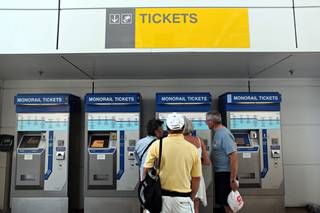Tuesday, Feb. 16, 2010 | 2 a.m.
Sun Archives
- Bond insurer: Las Vegas Monorail failed to prove eligibility for Chapter 11 bankruptcy (2-11-2010)
- Las Vegas Monorail bonds downgraded after bankruptcy filing (2-5-2010)
- Las Vegas Monorail argues against bankruptcy as municipality (2-3-2010)
- After all the promises, will taxpayers be stuck with the monorail’s bills? (1-22-2010)
- Judge sets hearing date in Las Vegas Monorail bankruptcy case (1-19-2010)
- Las Vegas Monorail files for bankruptcy protection (1-13-2010)
Related Document
Beyond the Sun
When Nevada issued bonds to finance the Las Vegas Monorail 10 years ago, one of the objections was that the state was, in effect, putting its good credit rating at risk by banking on the success of the monorail.
Now that the monorail is in default on those bonds and has filed for bankruptcy protection, it could force Nevada taxpayers to pay higher interest rates on money that the state borrows through bond financing, an attorney for a major creditor in the bankruptcy case warns.
The state sells bonds to finance big-ticket projects such as highways. The state’s bond rating affects the interest rate it gets on those bonds. The increased amount of interest taxpayers would have to pay for state public works projects could easily add up to millions of dollars over the duration of a bond if Nevada’s rating dropped.
In 2000, the state issued $650 million in industrial development revenue bonds on behalf of the monorail. This type of bond is intended for nonprofit corporations that serve a public benefit — in this case, to relieve traffic congestion from the adjacent Strip — and are to be paid from revenue generated by those projects instead of from taxpayers. It is general obligation bonds — which are issued by the state to build roads, schools and other public works projects — that taxpayers are responsible for paying off.
Still, the Nevada Taxpayers Association warned before the monorail bonds were issued, industrial revenue bonds can hurt taxpayers because if the entity that is supposed to pay them off can’t, bond rating agencies probably “would take a dim view” of the state.
Association President Carole Vilardo said the warning, issued with the monorail in mind, is why her organization pushed to have the bonds insured rather than have taxpayers on the hook.
“We were concerned because bonds for light rail and monorail projects historically had been too aggressive in their ridership estimates,” she says. “The ridership never lived up to the estimates.”
“Unfortunately,” Vilardo says, that turned out to be true in the Las Vegas Monorail’s case.
When the state issued the monorail bonds, Nevada considered the transit operator an “instrumentality of the state,” contends William Smith, a Chicago attorney for Ambac Assurance Corp., the Wisconsin company that insured most of the bonds sold to construct the monorail.
“If the state backs away from provisions it approved in 2000, that would make the bond markets uneasy,” he says. “In the bond markets you are not looking for reasons to draw attention to yourself except for good reasons.”
Chicago attorney James Spiotto, who has represented bondholders in litigation, said that even if the state is not liable for any debts the monorail fails to repay, Nevada “may have to explain to the rating agencies how this happened and why it won’t be repeated in the future.”
But Lon DeWeese, a chief financial officer with the Nevada Business and Industry Department, says the state’s bond ratings won’t be affected by the outcome of the monorail’s bankruptcy case.
“Rating agencies look at a state’s constitutionally balanced budget and the way it makes its investments,” DeWeese says. “The monorail has no effect on the state’s rating.”
Major bond rating agencies generally place Nevada in the AA, or high-quality range, meaning the state is a good bet to repay its general obligation bonds.
But Moody’s Investors Service issued a slight downgrade in May from Aa1 to Aa2 for Nevada based on its budget crisis and the downturn in the gaming industry, and Fitch Ratings in October lowered the state from AA-plus to AA for similar reasons. Smith predicts the rating decline will continue if bond investors lose their trust in the state based on the monorail case.
But Reno bond attorney John Swendseid says similar industrial development bonds have defaulted throughout the country without hurting a state’s bond rating.
“I would be very surprised if the state’s bond rating dropped because of this case,” he said.
The Business and Industry Department, which issued the bonds after they were approved by the state Board of Finance, has insisted that Nevada has limited authority over the transit operator. The state also says that taxpayers are not obligated to repay any of the monorail’s debt based on the way the bond contracts were worded.
Revenue from monorail riders and from advertising was supposed to pay off the bond debt but has fallen short. The monorail filed for Chapter 11 reorganization, claiming $500 million to $1 billion in debt.
U.S. Bankruptcy Judge Bruce Markell is scheduled to rule Wednesday on whether the case will proceed. Ambac says that if the monorail files for bankruptcy, it should be under Chapter 9, which is reserved for municipalities and other local government agencies. Some legal experts say Chapter 9 would give Ambac more say over the potential sale of monorail assets.


Join the Discussion:
Check this out for a full explanation of our conversion to the LiveFyre commenting system and instructions on how to sign up for an account.
Full comments policy